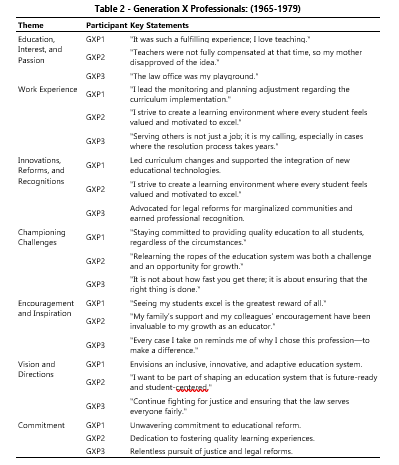Social Dynamics: A Phenomenological Exploration of the Lived Experiences of Social Science Professionals Across Generations
Main Article Content
Abstract
This study explores the interplay between social dynamics and the career development of social science professionals, focusing on how generational identities are influenced by and contribute to these dynamics. As societies evolve, the resulting shifts in behaviors, attitudes, and beliefs significantly impact individuals' career trajectories. This qualitative research employs a descriptive phenomenological approach to explore the lived experiences of social science professionals from different generations—Baby Boomers, Generation X, Millennials, and Generation Z. By analyzing participants' narratives, the study uncovers how social environments, shaped by historical, political, and economic contexts, inform career choices and professional growth. Key themes emerged from the analysis, highlighting distinct characteristics and motivations across generations. Baby Boomers exemplified resilience and adaptability, reflecting on their diverse career paths. Generation X demonstrated a commitment to education and innovation amidst systemic challenges. Millennials articulated a strong drive for social change, while Generation Z exhibited a search for meaning in their evolving professional identities. The findings emphasize that career development is a multifaceted journey, shaped by social dynamics that extend beyond personal choice to encompass broader societal influences. This research contributes to a deeper understanding of how generational experiences impact career decision-making, offering insights into fostering an adaptable and resilient workforce capable of navigating contemporary social challenges.
Article Details

This work is licensed under a Creative Commons Attribution 4.0 International License.
References
Abbas, M. A. L. et.al., (2018). The Attitudes and Consumption of Generation Xers and Baby
Boomers Filipino Parents Towards Digital Media.
Eldridge, A. (2024). Generation Z demographic group, Retrieved from: https://www.britannica.com/topic/Generation-Z
Basic, L. (2018). Examining generational differences in the workplace: employee engagement practices and their impact on retention of different generations of human resources employees in higher education. University of Massachusetts Global. Retrieved from https://digitalcommons.umassglobal.edu/cgi/viewcontent
Carlos, R.A.G. (2019). 87% of Filipinos approve of PRRD's performance: Pulse Asia. In Philippine News Agency Retrieved from https://www.pna.gov.ph/articles/1089277
Farmers, T. W., Talbott, B., Dawes, M., Huber, H. B., Brooks, D.S. & Powers, E. E. (2017). Social
Dynamics management: What is it, and why is it important for intervention? Journal of Emotional and Behavioral Disorders, Vol. 26 (1) 3—10.
Froidevaux, A. and Hirschi, A. (2019). Lifespan perspectives on careers and career development. In B. B. Baltes, C. W. Rudolph, & H. Zacher (Eds.), Work across the lifespan (pp. 235–259). Elsevier Academic Press. https://doi.org/10.1016/B978-0-12-812756-8.00010-4
Fitzpatrick, L. (2018). 5 Common workplace challenges and how to address them. In
Codelattice. Connecting Dots. https://www.codelattice.com
Giorgi, A. (1997). The phenomenological method's theory, practice, and evaluation as a
qualitative research procedure. Journal of Phenomenological Psychology, 28(2), 235–260. https://doi.org/10.1163/156916297X00103
Giorgi, A. (2008). A phenomenological perspective on certain qualitative research methods. In
Journal of Phenomenological Psychology. 39 (1):33-58
Grata, A. F. (2013). Transcending Humanity Inside the New Bilibid Prisons Through Prison
Spirituality. Asian Social Institute.
Keister, L. and Deeb-Sossa, N. (2004). Are Baby Boomers Richer Than Their Parents? Intergenerational Patterns of Wealth Ownership in the United States. Retrieved from: https://onlinelibrary.wiley.com/doi/abs/10.1111/j.1741-3737.2001.00569.x
Kraus, Markus (2017). Comparing Generation X and Generation Y on their preferred emotional
leadership style, Journal of Applied Leadership and Management, ISSN 2194-9522, Hochschule Kempten - University of Applied Sciences, Professional School of Business & Technology, Kempten, Vol. 5, pp. 62-75,
Koyuncuoğlu, Ö. (2021). An investigation of academic motivation and career decidedness among university students. In International Journal of Research in Education and Science (IJRES), 7(1), 125-143. https://doi.org/10.46328/ijres.1694
Kuligowski, K., (2022). Generation x: Who are they? In Business news daily. Retrieved from https://www.businessnewsdaily.com/15950-who-is-gen-x.html
Kumar, S.T., Sushama, & G.K., R., G. (2017). Career planning and development. In the 5th International Conference on Emerging Trends in Engineering, Technology,
Science and Management. www.conferenceworld.in
Kuranchie-Mensah E.B. & Tawiah, K. A. (2016). Employee motivation and work performance. A
Comparative study of mining companies in Ghana. In Journal of Industrial Engineering and Management. Retrieved from https://www.jiem.org
Leentje Volker (2019) Looking out to look in: Inspiration from social sciences for construction
management research, Construction Management, and Economics, 37:1, 13-23, DOI: 10.1080/01446193.2018.1473619
Lent, R.W. (2013). Social cognitive career theory. In Career Development and Counseling. Brown, S.D. & Lent, R.W. (2nd E.), Career Development and Counseling: Putting theory and research into work (pp;115–146). John Wiley & Sons Inc.
National Research Foundation. (2018, April) Human and social dynamics funding instrument. Knowledge advancement and support. Framework documents.
Neubauer BE, et. al. (2019). How phenomenology can help us learn from the experiences of
others. Perspect Med Educ. 2019 Apr;8(2):90-97. doi: 10.1007/s40037-019-0509-2. PMID: 30953335; PMCID: PMC6468135.
Nwokolo, C. & Chukwuma, R. N. (2021). Sources of career inspiration for adolescents in secondary schools and their career choice in Delta State. In Asian Journal of Education and Social Studies. Retrieved from https://www.semanticscholar.org
Parker, K., et.al. (2019). Generation Z looks a lot like millennials on key social and political issues. Pew Research Center.
Portus, L. (2020). Dr. Lourdes Portus’ Lecture on Developing Quality Research. In Philippine Social Science Council. Retrieved from https://www.pssc.org.ph
Sandeen, C. (2008). Boomers, Xers, and Millennials: Who Are They and What Do They Really
Want to Continuing Higher Education? Continuing Higher Education Review, Vol. 72.
Williams, H. (2021). The Meaning of “Phenomenology”: Qualitative and Philosophical Phenomenological Research Methods. The Qualitative Report, 26(2), 366–385. https://doi.org/10.46743/2160-3715/2021.4587
Wyant A. Manzoni, A. & McDonald, S. (2018). Social skills dimensions and career dynamics. In
Socius: Sociological Research for a Dynamic World. Vol. 4: 1-12
Zhu, H. et.al., (2021). The mediating roles of core-self-evaluation and career exploration in the
Association between proactive personality and job search clarity. In National Library of Medicine. National Center for Biotechnology Information. Retrieved from https://pubmed.ncbi.nlm.nih.gov/34149503/
Zelazko, A. (2024). Millennial Demographic Group. Retrieved from: https://www.britannica.com/topic/millennial
